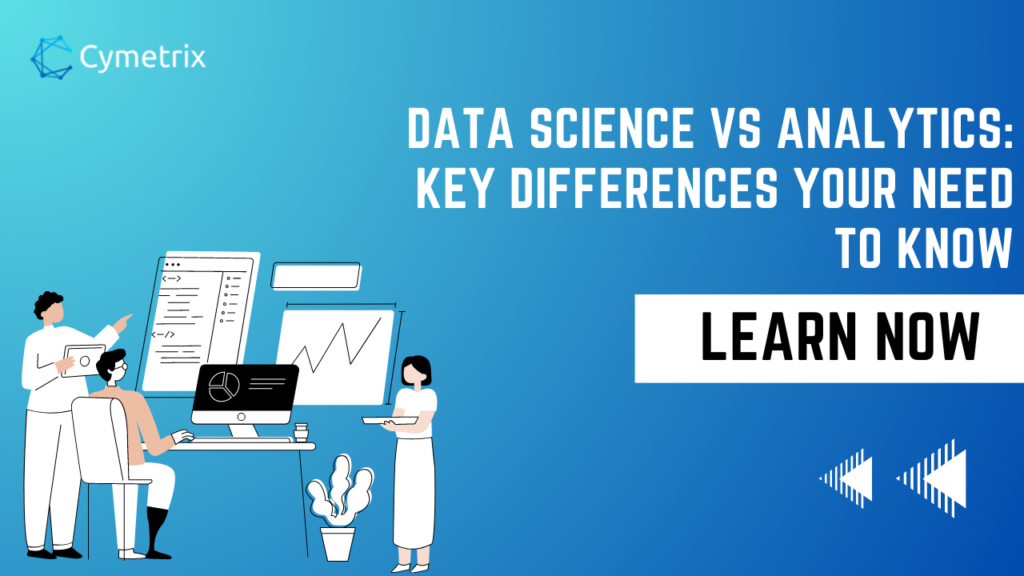
Introduction: Data Science vs Analytics
As the world becomes more data-driven, it is essential to understand the differences between data science and data analytics. Although these phrases are frequently used interchangeably, their goals, methodology, and applications differ significantly. As per the report by GlobeNewswire, the Data analytics market is expected to reach $130 billion by 2026. This statistic highlights the increasing demand for data science and analytics professionals in today’s job market. Today we will discuss Data Science vs Analytics, explore their applications, and provide insights into their career paths.
Whether you are a business owner looking to optimize your operations or an aspiring data professional pursuing a career in either field, this post will provide a comprehensive understanding of the differences between data science and data analytics, helping you make informed decisions.
Understanding Data Science
Data Science is an interdisciplinary field that uses scientific methods, processes, algorithms, and systems to extract insights and knowledge from structured and unstructured data. It involves the integration of various technologies such as machine learning, and data mining. Along with, statistical modeling, and programming languages such as Python, R, and SQL.
Businesses often utilize Data Science to extract insights from large amounts of data to improve decision-making, drive innovation, and develop predictive models. For example, a retailer can use Data Science to analyze customer data to understand purchasing patterns, preferences, and behavior. Thus, personalizing marketing strategies, optimize pricing, and forecast demand.
To pursue a career in Data Science, you should have a solid foundation in mathematics, statistics, and programming. Moreover, some primary skills required for Data Science include data preprocessing, feature engineering, model selection and optimization, and data visualization.
Data Scientists can work in various industries, such as healthcare, finance, marketing, and manufacturing. Some of the most common job roles in Data Science include Data Analyst, Machine Learning Engineer, and Business Intelligence Analyst.
Overall, Data Science is an exciting field that offers a range of opportunities for individuals with a passion for data analysis and a drive to solve complex problems.
Understanding Data Analytics
Data Analytics is a technical process of analyzing and interpreting data to draw insights and conclusions that inform decision-making. It involves collecting, cleaning, transforming, and modeling data to uncover patterns, relationships, and trends.
In businesses, Data Analytics is used to extract actionable insights from data to drive performance and optimize operations. For example, an e-commerce business can use Data Analytics to track website traffic, identify the most popular products, and optimize the website’s design to improve conversion rates.
To pursue a career in Data Analytics, you should have a good grasp of statistical analysis, data visualization, and database management. Additionally, some primary skills required for Data Analytics include data cleaning, visualization, modeling, and data interpretation.
Data Analysts can work in various industries, such as healthcare, finance, marketing, and retail. Some of the most common job roles in Data Analytics include Business Analyst, Marketing Analyst, Financial Analyst, and Data Analyst.
Key Differences: Data Science vs Analytics
While Data Science and Data Analytics are related fields that involve working with data, they differ in their focus, goals, and techniques.
The primary focus of Data Science is to develop predictive models and algorithms to extract insights and knowledge from structured and unstructured data.
Data Scientists often work with large, complex datasets and use various tools and techniques. It helps them to create models that predict future outcomes or identify patterns and trends. For example, a Data Scientist may use machine learning algorithms to build a fraud detection system for a financial institution.
On the other hand, the primary focus of Data Analytics is to analyze and interpret data to draw insights that inform decision-making. Data Analysts often work with smaller datasets and use statistical analysis and visualization tools to identify trends and patterns in the data. For example, a Data Analyst may use a statistical tool such as regression analysis to identify the factors leading to customer churn in a telecom company.
The goals of Data Science and Analytics are also different. Data Science aims to create models that can predict future outcomes or identify patterns in the data. Data Analytics helps to draw insights and conclusions from the data to inform decision-making.
The techniques and tools used in Data Science and Data Analytics also differ. Data Science often involves using complex algorithms such as neural networks, decision trees, and random forests. However, data analytics uses statistical analysis and visualization tools such as Excel, Tableau, and R.
Conclusion
In conclusion, data analytics is invaluable to businesses. It holds the potential to unlock new insights and opportunities that can drive growth and success. Yet without the proper knowledge, resources, and data, things can spiral out of control and become detrimental.
At Cymetrix, we understand the importance of harnessing the power of data. Our team of experienced professionals specializes in providing customized solutions to help businesses collect, analyze, and interpret data effectively. Whether you need help with data management, data analysis, or visualization, we have the expertise to help you make the most of your data.
If you’re ready to take your data strategy to the next level, contact us today to learn more about our services and how we can help you achieve your goals. Don’t let your data go to waste, with our Data Analytics Consulting you can unlock the full potential of data. If you want to continue reading more, you can get started by reading about Data Analytics vs Business Analytics. So, you will be able to understand which practice is better suited to your needs.
